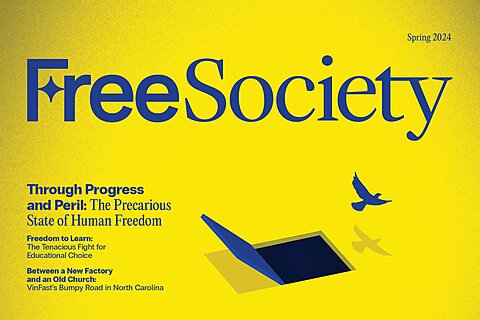I am honored to have written the first‐ever cover story for Free Society, Cato’s new quarterly magazine. Titled “Through Progress and Peril: The Precarious State of Human Freedom,” the article addresses the subject that keeps lovers of liberty awake right now: The worrying decline of freedom, the rise of illiberalism at home and authoritarianism abroad, and what we can do to turn the tide.
I document the disheartening trends in personal and economic freedom in the last few years and suggest several reasons that explain why this has happened, including COVID-19 and the heavy‐handed state actions that accompanied it. Emergencies, as F. A. Hayek argued, “have always been the pretext on which the safeguards of individual liberty have been eroded.”
The Human Freedom Index 2023, published by the Cato Institute and the Fraser Institute, concluded that almost 90 percent of the world’s population has seen its liberties circumscribed in recent years. In terms of economic freedom, a decade of global progress was erased in the year 2020 alone.
But the picture is mixed. Throughout this time, individuals, entrepreneurs, and activists have adapted to difficulties and threats, and have crafted innovations and creative solutions to problems caused by increased government interference. The result is that indicators of human living standards are still improving at a rapid pace.
This is where we find hope: Free men and women accomplish great things. Open societies fail only when we don’t believe in our ideals, defend them, and apply them. Authoritarians and statists have a more serious weakness: they fail when they manage to implement their ideas. Look around the world! Dictators, authoritarians, and populists are making such a huge mess out of things that they’re already writing the best arguments against their own policies—we hardly have to do it for them.
I think people are willing to listen to our case. Contrary to some commentators’ suggestions, most people have not joined the dark side; they are just exhausted with our increasingly tribal and ill‐tempered parties and tune out. Only four percent of Americans say they experience excitement when they think of politics.
So, the key message is that we should not despair. These kinds of backlashes against liberty have occurred regularly throughout history, but most of the time they haven’t prevailed. And they won’t this time if friends of liberty step up to the challenge and fight back. Nothing is hopeless—unless we assume that it’s hopeless and decide to give up. I know that Cato won’t and I trust that others will join us in this crucial intellectual battle for human liberty and dignity.




